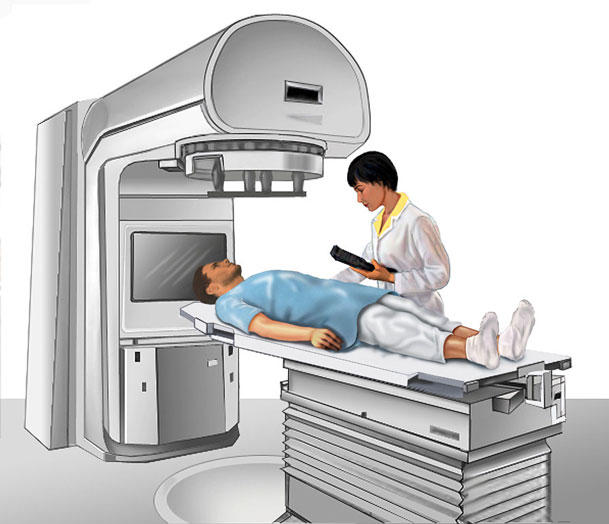
Diagnosed with Cancer? Your two greatest challenges are understanding cancer and understanding possible side effects from chemo and radiation. Knowledge is Power!
Learn about conventional, complementary, and integrative therapies.
Dealing with treatment side effects? Learn about evidence-based therapies to alleviate your symptoms.
Click the orange button to the right to learn more.
- You are here:
- Home »
- Blog »
- side effects ID and prevention »
- Radiation-induced Intestinal Damage
Radiation-induced Intestinal Damage

Radiation-induced intestinal damage is what oncologists call the short and long-term damage that cancer patients can sustain when getting radiation therapy to their lower back, pelvis, stomach, pretty much anywhere near the mid-section of their body.
In fairness, I have to begin this post by saying that the radiation quelled the bone pain that resulted from my bone lesions. In my case local radiation was the typical “palliative” therapy for a person with my cancer- multiple myeloma.
Palliative therapy bought me the six months I needed to undergo an alternative therapy that put me into complete remission.
What is radiation-induced intestinal damage?
Radiation-induced intestinal damage refers to damage to the intestines caused by exposure to ionizing radiation. Ionizing radiation has enough energy to remove tightly bound electrons from atoms, leading to the formation of ions and free radicals. This type of radiation is commonly used in medical treatments such as radiotherapy for cancer, but it can also result from accidental exposure or radiation therapy for non-cancerous conditions.
The intestines are particularly sensitive to radiation because they contain rapidly dividing cells, which are more susceptible to the effects of ionizing radiation. Radiation-induced intestinal damage can manifest in several ways:
- Mucositis: This is inflammation and ulceration of the mucous membranes lining the digestive tract, including the intestines. It can lead to symptoms such as abdominal pain, diarrhea, and blood in the stool.
- Diarrhea: Radiation can damage the cells lining the intestines, affecting their ability to absorb water and nutrients. This can result in diarrhea, which may be acute or chronic.
- Malabsorption: The damage to the intestinal lining can impair the absorption of nutrients, leading to malabsorption. This can result in nutritional deficiencies and weight loss.
- Fistulas: In some cases, radiation-induced damage can lead to the formation of abnormal connections (fistulas) between different parts of the intestines or between the intestines and other organs.
- Strictures: Scar tissue formation may occur in the intestines, leading to the development of strictures or narrowings. This can cause bowel obstruction.
What nutritional supplements help radiation-induced intestinal damage?
- Glutamine: This amino acid is known for its role in supporting the integrity of the intestinal mucosa. Some studies suggest that glutamine supplementation may help reduce radiation-induced intestinal damage.
- Omega-3 fatty acids: These essential fatty acids found in fish oil have anti-inflammatory properties and may support gastrointestinal health. They could potentially help mitigate inflammation caused by radiation.
- Probiotics: Maintaining a healthy balance of gut bacteria is crucial for overall digestive health. Probiotics, such as Lactobacillus and Bifidobacterium strains, may help support the gut microbiota and reduce inflammation.
- Vitamin E: As an antioxidant, vitamin E may help protect cells from the damaging effects of free radicals generated by radiation. However, evidence for its effectiveness in preventing radiation-induced intestinal damage is not conclusive.
- Vitamin D: Vitamin D has immunomodulatory effects and plays a role in maintaining intestinal health. Some studies suggest that vitamin D supplementation may have protective effects against radiation-induced damage.
- Zinc: Zinc is involved in the repair and maintenance of intestinal mucosa. It has been studied for its potential role in reducing radiation-induced damage to the gastrointestinal tract.
- Curcumin: The active compound in turmeric, curcumin, has anti-inflammatory and antioxidant properties. Some research suggests that it may help protect against radiation-induced intestinal damage.
The purpose for this blog post is:
- To highlight and educate cancer patients about radiation-induced intestinal damage and
- To encourage cancer patients undergoing radiation therapy to then undergo evidence-based non-conventional therapies such as nutritional supplementation (see above), hyperbaric oxygen therapy and finally FFT therapy (see below).
Conventional oncology does not promote non-conventional therapies such as supplementation or HBOT. Therefore, you, the patient, must think outside the conventional oncology box.
Have you been diagnosed with cancer? What type? What stage? Are you or have you undergoing radiation to your mid-section? Let me know if you’d like to learn more about Side Effect therapies. David.PeopleBeatingCancer@gmail.com
Hang in there,
David Emerson
- Cancer Survivor
- Cancer Coach
- Director PeopleBeatingCancer
Fecal bacteria-free filtrate transplantation is proved as an effective way for the recovery of radiation-induced individuals in mice
“Background: Ionizing radiation can cause intestinal microecological dysbiosis, resulting in changes in the composition and function of gut microbiota. Altered gut microbiota is closely related to the development and progression of radiation-induced intestinal damage. Although microbiota-oriented therapeutic options such as fecal microbiota transplantation (FMT) have shown some efficacy in treating radiation toxicity, safety concerns endure.
Therefore, fecal bacteria-free filtrate transplantation (FFT), which has the potential to become a possible alternative therapy, is well worth investigating.
Herein, we performed FFT in a mouse model of radiation exposure and monitored its effects on radiation damage phenotypes, gut microbiota, and metabolomic profiles to assess the effectiveness of FFT as an alternative therapy to FMT safety concerns…
Conclusions: FFT improves radiation-induced intestinal microecological dysbiosis by reshaping intestinal mucosal barrier function, gut microbiota configurations, and host metabolic profiles, highlighting FFT regimen as a promising safe alternative therapy for FMT is effective in the treatment of radiation intestinal injury.
Radiation-induced small bowel disease: latest developments and clinical guidance
“Radiotherapy is a mainstay of oncological treatment for a variety of malignant diseases and is commonly administered to the abdomen and pelvis of patients with gastrointestinal (GI), urological and gynaecological cancers. It is recognised that patients may subsequently develop a range of GI side effects.
Radiation damage to small bowel tissue can cause acute or chronic radiation enteritis producing symptoms such as pain, bloating, nausea, faecal urgency, diarrhoea and rectal bleeding which can have a significant impact on patient’s quality of life.
‘Radiation enteritis’ is a term traditionally used to define injury to the small intestine resulting from radiotherapy…
There has been a recent consensus that ‘pelvic radiation disease’ most accurately describes the phenomena of GI injury secondary to radiotherapy, however ‘radiation-induced small bowel disease’ is probably the most accurate description of the disease process and will be used within this paper…


